Page 3



Page 3


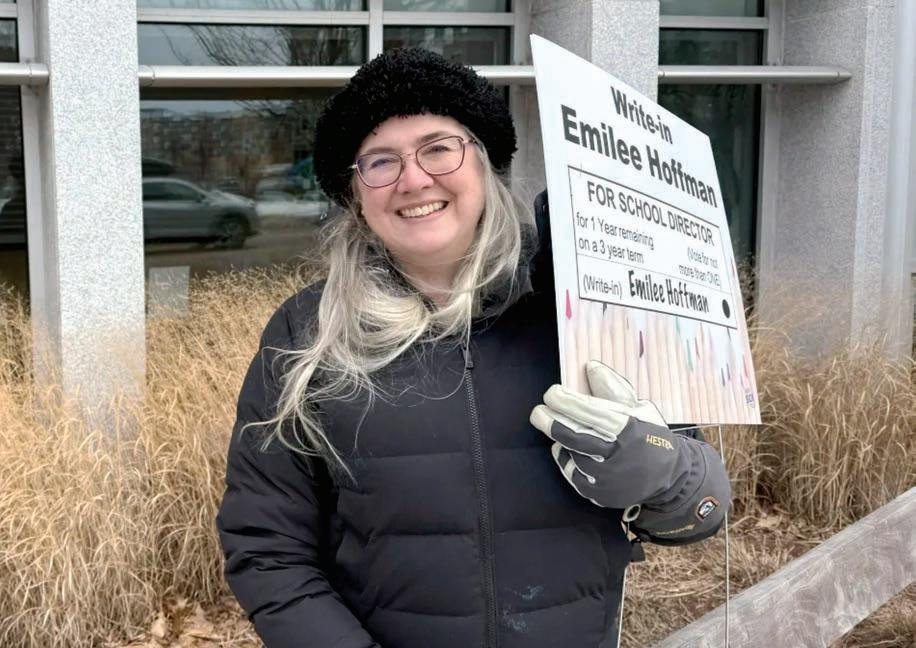
increase on the tax rate.
South Burlington residents approved a $55.8 million city budget on Town Meeting Day, 2,301-1,276.
The budget is lower than the current year’s spending and will result in a smaller-than-expected
The bulk of the spending comes from the city’s proposed general fund budget — which includes all revenues and expenses related to day-to-day city operations. That $36.1 million represents a roughly 2.5 percent increase in spending over the current year and comprises nearly

65 percent of the overall spending plan.
Other drivers in the budget include:
• Wastewater: $7.5 million
• Stormwater: $6.4 million
• Drinking water: $4.5 million
See CITY BUDGET on page 12
LIBERTY DARR STAFF WRITER
Voters Tuesday narrowly approved the $71.5 million South Burlington school budget on the first try, a far cry from last year, when they shot down the budget twice.
The spending plan was approved 1,864-1,737.
Since December, school district officials have touted this budget season as one of the most difficult they have had to grapple with, especially since the price tag came with the reduction of roughly 15 full-time equivalent positions. The plan includes a roughly 7 percent increase over last year’s expenditures with an associated projected tax rate of nearly 8 percent.
The spending increase is largely indicative of a roughly 2.5 percent inflation rate and the state-mandated district contributions to employee health benefits programs, which are estimated to increase by more than 11 percent, with nearly 75 percent of the expenditure plan to compensate for employees’ salaries and benefits.
While the district has control over major aspects of the budget, there are a number of factors that remain outside of local officials’ hands. Factors like the common

level of appraisal — or real estate inflation — yield and pupil weights all play a major role in the state’s education financing formula and ultimately play an even bigger role in the tax rates residents will be paying.
The district has also been negatively affected by a shift in the state’s education funding formula known as Act 127. The law, while meant to better equalize education, updated the state’s equalized pupil-weighting system and gave more “value” to students from lower-income families, English language learners, students from low-population districts and small schools in sparsely populated districts.
This year, the South Burlington School District’s pupil weights, based on the new methodology, dropped just over 60 points over last year, causing a negative impact for the district’s revenue streams and ultimately, resident’s tax rates.
This year’s passage stands in stark difference to last year. The current budget, slightly over $68 million, passed only after two other proposed budgets failed last year. The associated tax increase of 8.18 percent was the second
See SCHOOL BUDGET on page 13

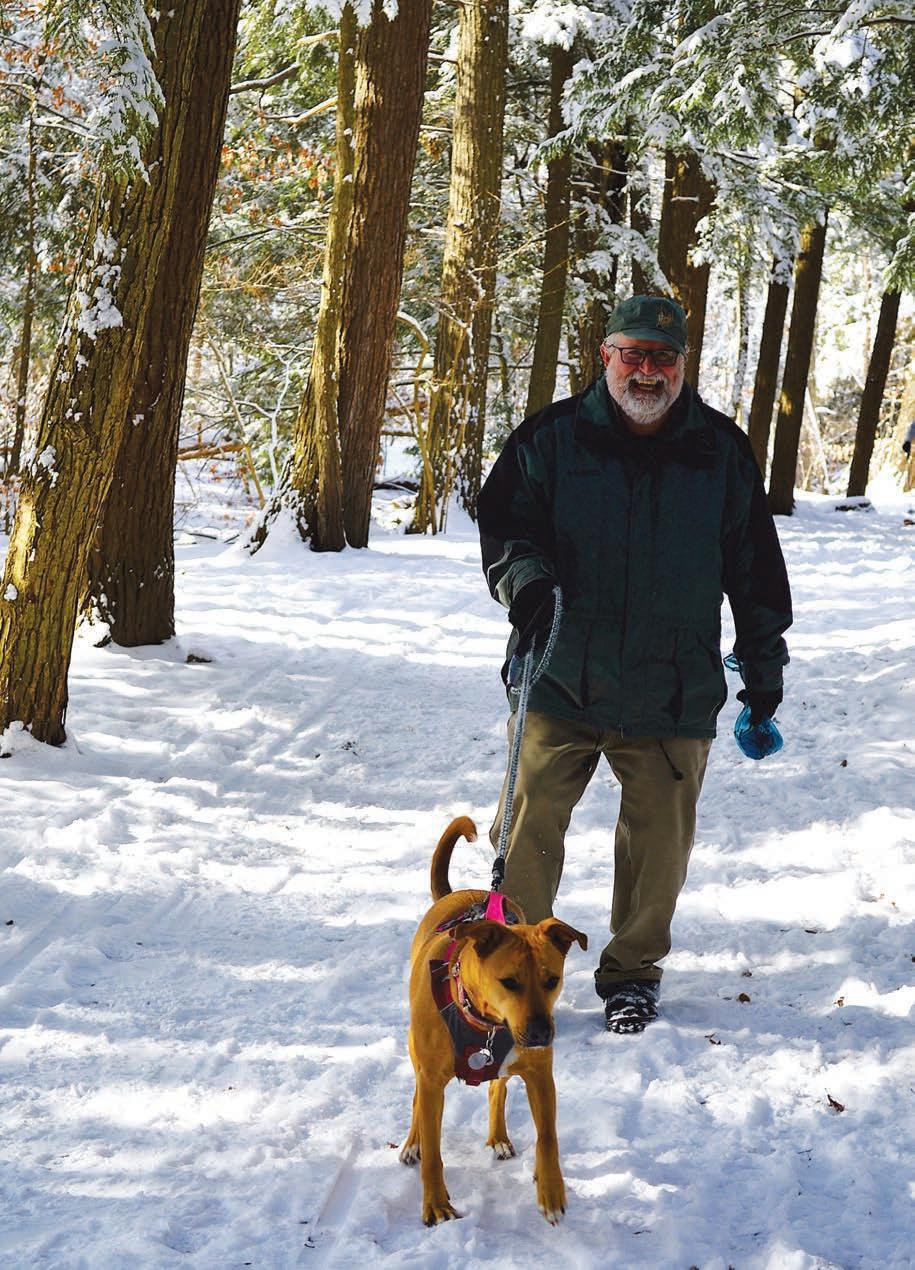

Susanna Stinnett captured several four-legged and two-skied explorers on a recent trek through the trail network at Red Rocks Park in South Burlington. March didn’t exactly come in like a lion — more like a few tail-wagging pups.

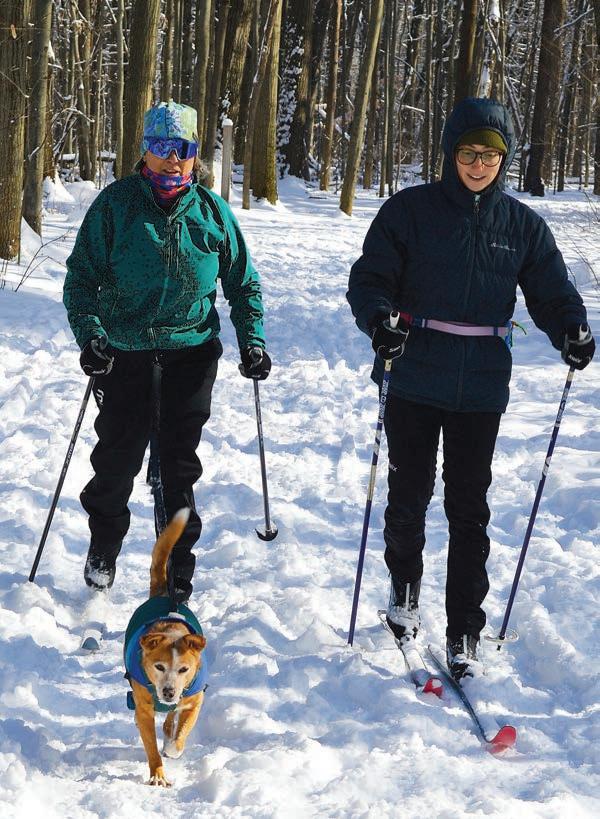
LIBERTY DARR STAFF WRITER
Aaron Fastman may just be Vermont’s unofficial junk removal guy.
Most Vermont residents may remember Fastman from a business he bought into 13 years ago, 1-800-Got Junk, the Williston-based franchise that touted making unwanted items — anything from furniture, appliances, mattresses, and more — disappear.
His newest venture moves from focusing on disposing of the junk you’ve been hiding in the basement or attic and into the world of what we often keep right in our back pockets — electronics.
PayMore, Fastman’s new store at the Blue Mall on Dorset Street in South Burlington, is an extension of the junk business, working to give new life to electronics that otherwise would have sat unused. The best part is customers can now get cold hard cash for bringing in their old gadgets.
“You can list stuff on Facebook Marketplace and Craigslist and those types of places and there’s nothing wrong with them. But some people don’t want strangers to come in their house, or people don’t respond to emails,” Fastman said.
Fastman sold 1-800-Got Junk just before the pandemic, but during his time owning the company saw a massive need for a sustainable approach to electronic waste. According to Vermont’s Department of Environmental Conservation, e-waste is the fastest-growing type of waste in the nation.
In Vermont, it is illegal to dispose of electronics in the trash
or regular recycling bins due to the materials contained in many of the devices. And while certain electronics — computers, monitors, TVs, printers, and computer accessories — can be disposed of through the VT E-Cycles program at no cost, other electronics may cost a fee for disposal.
The recycling program was created in 2011 after a bill passed by legislators in 2010 required manufacturers of electronics to finance the cost of collecting and recycling their discarded products. In 2015 alone, Vermont recycled over 4.6 million pounds of electronics.
According to data from the Chittenden Solid Waste District, the team collected 561,139 pounds of electronics, in 2023. Last year, that number was down slightly, at 541,364 pounds. Good Point Recycling, the district’s electronics recycling vendor, picks up sorted electronics on a weekly basis and transports those materials to their facility in Middlebury for proper recycling.
“Before we suggest recycling those materials, we always encourage residents and businesses to see if they can be reused in anyway,”
Beth Parent, community engagement and outreach manager with the waste district, said.
That’s exactly what Fastman is hoping to do with PayMore.
Sustainability is now becoming its own economy, he said, something he saw firsthand with the junk removal business for over a decade. When the opportunity to buy PayMore came across his table, it was a no-brainer.
The store, which operates with four employees plus Fastman and store co-owner Elisa Bernard Calderwood, also acts as a retail

Order by Tuesday for Wednesday pickup at The Mill Market and Deli 1580 Dorset Street South Burlington
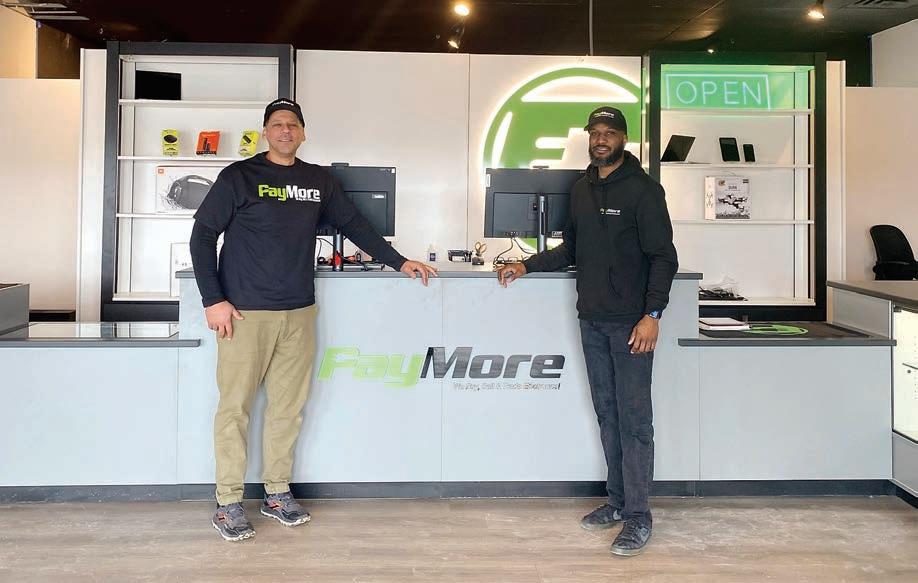
floor where people can buy used electronics, all of which are sold in mint condition, and get a better bang for your buck.
Fastman said the franchise is one of the fastest growing in the
nation, and it will only make one appearance in Vermont — the South Burlington store — but it is forging ahead with plans to bring this concept to several areas of the Northeast.
“We feel like we are really a big part of this,” Fastman said.
“People want to recycle, they want to make sure that their stuff gets a second life, and now they have the opportunity to do that.”
















MIKE DONOGHUE CORRESPONDENT
The Shelburne Police sergeant involved in an on-duty fatal cruiser-bicycle crash was believed to have been slightly over the speed limit and had a YouTube video displayed on his computer screen, according to Vermont State Police.
Yet there is no evidence in the state police crash report that Shelburne Sgt. Kyle T. Kapitanski did not have his eyes on Shelburne Road before he struck the bicyclist near Fayette Drive about 2:45 a.m. Nov. 11, 2024.
Sean P. Hayes, 38, was wearing dark clothes and had no reflective gear that would have helped illuminate his presence on the road, according to the state police crash report, obtained Monday.
Hayes had dismounted his bicycle and appeared to be on the fog line when struck, police said. Because he was off his bike, Hayes is referred to as a “pedestrian” at times in the report.
A headlamp to illuminate the road in front of Hayes was found among the debris at the crash site, but was not operating when seized, police said. A video camera of a
nearby business seems to indicate the headlamp was working as Hayes passed by just before the crash, police said.
The investigation — which included a reenactment of the crash several days later — indicates Kapitanski would not have seen him due to the large trailer the bike was towing, according to trooper Christopher Hein of the state police crash reconstruction team.
The report estimates Kapitanski was driving about 40 miles per hour in the 35-mph zone and continued a short distance before stopping and reporting to a dispatcher he may have hit something.
Chittenden County State’s Attorney Sarah George directed state police to cite Kapitanski into criminal court on March 13 to face a charge of gross negligent operation.
It is unclear what George plans to rely on for the criminal charge. The crash report only mentions a possible civil violation.
Defense lawyer David Sleigh had said earlier he had no idea what the alleged negligent operation might involve. Attempts
South Burlington’s Community Newspaper Since 1977 A publication of Vermont Community Newspaper Group LLC otherpapersbvt.com
Advertising Director Judy Kearns judy@otherpapersbvt.com (802) 734-2928
Advertising Wendy Ewing wendy@shelburnenews.com (802) 238-4980
Editor Tommy Gardner tommy@stowereporter.com (802) 253-2101 x25
Staff Writers
Aaron Calvin Liberty Darr Patrick Bilow Briana Brady
Production/Design
Stephanie Manning stephanie@shelburnenews.com Kristen Braley kristen@stowereporter.com
General Manager Katerina Werth katerina@stowereporter.com
Billing inquiries Leslie Lafountain leslie@stowereporter.com (802) 253-2101
Advertising submission deadline: Friday at 5 p.m. advertising@otherpapersbvt.com classifieds@otherpapersbvt.com
Editorial submission deadline: Friday at 12 p.m. news@otherpapersbvt.com
Calendar submission deadline: Friday at 12 p.m. news@otherpapersbvt.com
Contact: 1340 Williston Road South Burlington, VT 05403 (802) 985-3091
to reach Sleigh this week were unsuccessful.
The state police report said investigators believed the cause of the crash was Kapitanski “passing a vulnerable user, in this case a pedestrian or cyclist without care or due regard.”
Questions about what both Kapitanski and Hayes were doing at that location also are partially answered in the police report.
Kapitanski, who was working the overnight shift, had gone to the nearby Jolley Store further north on Shelburne Road to buy a few items. There are no stores open overnight in Shelburne.
Police said Kapitanski declined to provide a statement
before the report was completed. Investigators learned from Hayes’ parents that it was not abnormal for their son to ride his bike during the time of the crash, 2:45 a.m. They also reported their son “dumpster dived” during the same hours, police wrote.
His obituary had said Hayes was a Burlington native and lived here most of his life. It also said he was a 2004 graduate of Burlington High and that he had attended Becker College in Massachusetts.
Kapitanski, 41, of Randolph, remains on paid leave from the town of Shelburne. He is a 22-year police veteran with several departments, including a one-year stint as police chief in
Richmond before Shelburne hired him in 2022
George’s decision to charge Kapitanski came one month after state police provided her an elaborate investigative report compiled by members of the state police Crash Reconstruction Team and the detective bureau.
The estate of Sean Hayes filed a civil lawsuit against the town of Shelburne in January. Kapitanski was not named as a defendant in the wrongful death lawsuit filed by Burlington lawyer Brooks McArthur.
Shelburne town employees, including off-duty police, said they learned about the crash through the media.
Burlington Police Blotter: Feb. 24 - March 3
Total reported incidents: 196
911 hang-ups: 8
Crashes: 13
Alarms: 14
Animal problems: 3
Arrests on warrants: 2
Agency assists: 12
Public assists: 8
Directed patrols: 13
Disturbances: 9
Domestic incidents: 3
DUI: 2
Foot patrol: 2
Found/lost property: 3
Larceny: 6
Mental health issues: 2
Motor vehicle complaints: 11
Retail theft: 7
Stolen vehicle: 3
Suspicious events: 13
Threats: 3
Traffic stops: 14
Trespass: 7 Welfare check: 11
Arrests:
Gabriella Hope, 33, of Winooski, for criminal threatening, violating of an abuse prevention order and violating conditions of release, after an investigation into a Jan. 30 incident Williston Road.
Vincent R. Cataloni, 21, of Three Rivers, Mass., for unlawful mischief, after a Feb. 2 incident on Shelburne Road.
Feb. 24 at 12:23 p.m., Trevor J. Hoag, 49, and Samantha A. Tonnessen, 37, no address

listed for either, both for retail theft on Dorset Street.
Feb. 24 at 2 p.m., Matthew Delisle, 42, no address listed, for a sex offender registry violation, on Dorset Street.
Feb. 24 at 2:47 p.m., Maurice R. Jackson Jr., 32, of Staten Island, as a fugitive from justice, on Gregory Drive.
Feb. 25 at 6:19 p.m., Zachary Wolliam Dalley, 43, of Burlington, for a sex offender registry violation, on Maple Tree Place.
Feb. 26 at 11:04 a.m., Desiree L. Wells-Cooper, 40, of Essex Junction, for possession of cocaine, on Dorset Street.
Feb. 26, at 11:22 p.m., a juvenile, 17, no address listed, for driving under the influence, on Barrett Street.
Feb. 27 at 4:08 p.m., Nicole J. Mann,. 30, no address listed, for retail theft on Dorset Street.
Feb. 28 at 2:52 a.m., Quentin N. Greenwood, 30, no address listed, on an in-state warrant on Williston Road.
Feb. 28 at 10:03 p.m., Travis J. Simpson, 29, of Burlington, for driving with a criminally suspended license at the corner of Shelburne Road and Laurel Hill Drive.
March 1 at 2:22 p.m., Brian Anthony Jagodzinski, 63, of Stowe, on an in-state warrant and for DUI criminal refusal.
Note: Charges filed by police are subject to review by the Chittenden County State’s Attorney office and can be amended or dropped.
Sen. Kesha Ram Hinsdale
If you ask Vermonters why property taxes keep rising, you’ll likely hear about school budgets, state mandates or even the way we fund education. But one factor isn’t getting enough attention: our housing shortage.
For years, Vermont has struggled with a lack of housing. The pandemic only made things worse, driving up demand while construction lagged behind. The result? Higher property values, higher reappraisals and, ultimately, higher property taxes.
across fewer, more expensive properties.
This isn’t just an issue for homeowners who have seen their tax bills spike. It also puts pressure on renters, as landlords pass increased costs onto tenants.

Fewer homes mean higher property values and more financial strain on Vermonters.
actually afford.
• Fix permitting rules — streamline approvals to get new housing built faster.
• Use targeted tax incentives to help towns fund projects that boost the local economy and housing supply.
When towns reassess property values, they base them on current market conditions. If housing is scarce, home prices skyrocket. When home prices go up, tax bills follow — because our tax system spreads school costs
The solution is simple: build more housing. More housing means more taxpayers sharing the cost of education and services, which reduces the burden on any one homeowner. Expanding our housing stock grows the grand list — the total taxable property value in a town — helping to stabilize tax rates.
Here’s how we can make that happen:
• Build “missing middle” housing by investing in homes that working families, young professionals and retirees can
Letters to the Editor
Our bosses are the voters and taxpayers
To the Editor:
By the time you read this, I hope I’m one of your newest school board members. At the time of writing, I don’t know if the budget passed or failed.
It’s been a rough ride since 2019, when you, the voters, crushed a proposal to build a new school by a vote of 6,514-1,712. That was a strong message. But maybe you still didn’t feel heard, because school budgets and taxes still went up and up.
Trust is at a new low. Schools need fixes. But many of you feel taxation without representation. We fought a war over that. So, what are we going to do?
I believe we should focus on being middle class. For every issue, we should ask, “How can we make South Burlington a middle-class place to live?”
Everybody knows that middle class America is the best place
for everybody of all ages and lifestyles.
Retirees and people who don’t have kids should love living here. Families should raise their kids here. And I hope the kids love it so much they stay here too.
Fellow school board members, let’s do our part. Our boss is the voters and the taxpayers. The superintendent works for us. Let’s guide her to make budgets that have the consent of voters.
Seamus Abshere South Burlington
Abshere ran unopposed this year for the South Burlington School Board.
Long View’s conservation value was lost in debate
To the Editor:
Too often the coverage of the Long View Project has neglected the most basic fact — location, location, location. It is ideally
• Repurpose underused buildings by converting excess school or commercial space into housing.
Vermonters shouldn’t have to choose between staying in their homes and funding our schools. By expanding housing, we can grow our economy, reduce the tax burden, and strengthen our communities.
Let’s talk about the real drivers of rising property taxes, and do something about them.
Kesha Ram Hinsdale, a Democrat from Shelburne, serves the towns of South Burlington, Shelburne, Charlotte, Hinesburg, Burlington, St. George, Underhill, Jericho, Richmond, Williston and Bolton in the Legislature.

situated in the middle of two already conserved pieces of land, the 113 acres of preserved land in South Village and the City-owned Hubbard Natural Area. One of South Burlington’s most important ecosystems, the Great Swamp, lies within these properties.
Conserving this land would have created a continuous wildlife and habitat buffer, as well as protecting public access to trails running throughout the area. Insinuating that the Southeast Quadrant unfairly benefits from conservation efforts because of wealth overlooks the fact that it is the last area to be developed by the city, therefore it provides the last and greatest opportunity for conservation efforts.
The rejection by the city has cost 16 affordable homes, significant environmental benefits, and loss of what most new residents value — open space and an outdoor culture. What a shame.
Susan Darnell South Burlington
The House Committee on Government Operations and Military Affairs has settled the Bennington election, begun to address election reforms, heard requests for changes in regulations from Cannabis industry members and met with its counterpart Senate committee about the possible new school district elections.
As with any session, there are many pressing issues and needs, in addition to ongoing “housekeeping” the Legislature carries out as part of its constitutional duties like passing the state’s Budget Adjustment Act and budget. This year, all of this is happening while federal funds and agency staff, funds which make up about a third of the Vermont state budget, are being erratically cut and removed from their posts.
Vermont. What no one usually says explicitly in these trainings is how the tall kid acquired then lost his box.
If “society” took the box away from the tall kid to give to others, what, if anything, will society do for the tall kid? In other words, how we are interpreting this as an approach to the collection and distribution of resources — and is it what we intend and want?

The tall kid undoubtedly has other needs, and the shorter kids have some advantages. But if we only see needs and advantages with one narrow lens, we miss the complexity of human development and potential and become stuck in an endless search for boxes to take away. Searching for “equity” then becomes a quest to level down and is at odds with what most people want, which is something to look forward to and to work toward.
American politics has always involved the swinging “pendulum.” However, most people seem to agree it has been swinging farther and farther apart in recent years. Though President Biden himself symbolized a moderating, calming figure most people longed for after Trump and the pandemic, Biden’s administration was largely comprised of Senator Warren folks whose views were different than most the rest of the country’s.
These views are often introduced in academic and service sectors with a cartoon meant to illustrate the difference between “equity” and “equality.” The cartoon depicts three kids looking over a fence watching a baseball game. All the kids are standing on top of boxes, and the tallest kid could see the game without a box; the other two need boxes to see at all; the smallest kid needs a bigger box than he has if he is going to see. Once people have seen the cartoon, the presenter then explains how this is the difference between equality — every kid gets a box — and equity — only kids that need them get them. Equity, according to this cartoonist, is the next logical step in our societal evolution of the role of government.
Besides being a simplistic metaphor for comparing complex economic and political systems, this cartoon has been unsatisfying for me for some time, especially as it has influenced how we consider distributing education funds in
People want resources to be distributed fairly and for every kid to be able to make the most of their talents and interests and become self-sufficient. Most people also want to make sure that a kid who needs something specific and unique to participate can have it, within reason — the Americans with Disabilities Act also requires this. And most people don’t think it’s reasonable, desirable, or effective to try to eradicate all individual advantages.
As a former educator, research I was made aware of showed that students who went from less resourced schools to more resourced schools experienced increases in both the quantity and the quality of their learning. Instead of taking more and more resources away from the successful schools in Vermont, it seems, at least for high school students, we would be more successful by moving students from less resourced schools to bigger schools with more opportunities within their regions. We would be building toward something better for everyone.
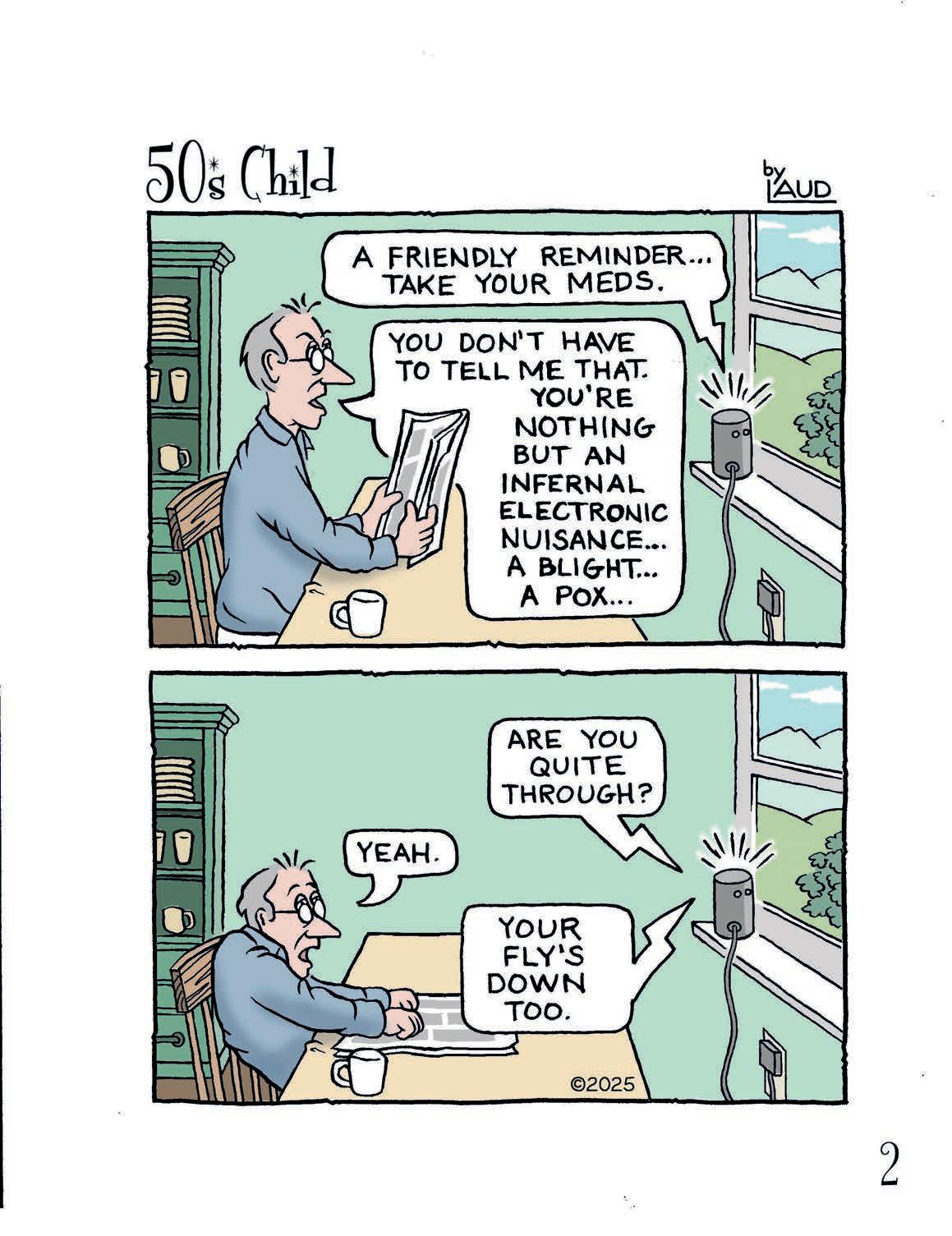
younger families to move here to gradually replace the older, retired population.
I think it’s important that leaders at least sometimes speak to everyone at the same time about the promise they see in our future, our potential and our ability to overcome challenges and improve our lives. I think Vermonters, along with our fellow Americans, want to succeed and help each other succeed and achieve our
Vermonters with low and modest incomes desperately need homes they can truly afford. For most of them, though, their needs are unlikely to be met. Instead, developers are constructing the opposite: homes that range in prices from $500,000 to well over $1 million.
Such extravagance is unlikely to produce the dynamic, growing economy that will keep young Vermonters here and entice
Builders, developers, realtors, lending institutions and collaborating, landlord-friendly legislators know what the open market will bear, and they are more interested in padding their profit margins rather than providing a range of options for average Vermonters, including apartments, multi-family duplexes/triplexes and single-family homes.
If anything, the unspoken mantra, “profits over people,” is
at the heart of Vermont’s housing shortage.
Chittenden County is ground zero for greed and profiteering. Here, where there are many job openings, a building frenzy is underway. A quick look at some local sites says it all. Homes at the Spear Meadows development in South Burlington start at $769,500. The massive O’Brien Hillside project has homes that range from $640,000-$1.2 million. Kwiniaska Ridge in
Emilie Krasnow
This month, Vermonters came together for Town Meeting Day to vote on local policies and budgets. These decisions directly affect us all, particularly those in need. Democracy thrives through participation, and town meeting exemplifies that principle in action. I joined many of you at the South Burlington pre-town meeting public information session.
As we approach the halfway mark of the 2025 legislative session, legislative priorities are shaping up. We’re working on sustainable property tax reforms and transformative changes in public education to ensure a high-quality and equitable system for all students. We are also tackling issues in healthcare, housing, and climate resilience.
• Gov. Phil Scott’s decision support team evaluating federal tariffs.
In addition, the House Commerce & Economic Development Committee is addressing concerns about federal employees, as 6,800 Vermonters face uncertainty about their job futures.

The House passed a Budget Adjustment Act, responding to unexpected revenue growth with additional funds directed to healthcare, mental health services, nursing homes, housing, and flood relief.
resources and support they need to thrive in safe, stable housing.
The House Committee on General and Housing is addressing Vermont’s housing crisis by focusing on deregulation in urban and village centers and creative financing for lower- and middle-income housing. Legislative efforts aim to streamline local zoning, lower construction costs, and improve housing accessibility for all Vermonters, especially seniors and those with disabilities.
providers.
• H.315 requires nondiscrimination concerning a parent with a disability.
• H.172 establishes a Common Interest Community Resource Center supporting homeowners’ associations.
• H.250 opposes perfluoroalkyl and polyfluoroalkyl substances in firefighting personal protective equipment and station wear, supporting our firefighters and eliminating toxic chemicals from their equipment, a request from the firefighters’ union.
• H.14 prohibits the use of animals in product testing.
relief and excludes medical debt from credit reports I was honored last month to receive the Tomorrow’s Leader Award at the Vermont House Democrats Speaker’s Soirée. As a younger legislator, I’m proud to inspire change and shape the future. Public service is about what we give, not what we get. We cannot wait for change to happen; we must build it, encourage it, and be a model for those who follow us. Let’s keep working together to serve the people of Vermont and inspire the next generation of leaders.
Some key committee actions include:
• Strengthening our healthcare system and ensuring fair wages for care providers.
• Investing in sustainable housing solutions, with a focus on smart development and supporting vulnerable communities.
• Reforming public education funding to maintain quality while addressing rising costs.
Federal changes under the new administration are already affecting many Vermonters, with over a third of the state’s budget relying on federal funding. Legislative leadership is working to understand and address these impacts. State initiatives include:
• Treasurer Mike Pieciak’s task force to track the federal impact.
• Attorney General Charity Clark’s efforts to challenge unconstitutional federal actions.
Trying
Work has begun on the FY26 budget, with the House Committee on Appropriations considering testimony and recommendations from policy committees. The House Committee on Health Care is focusing on addressing the fragility of Vermont’s healthcare system. Proposed legislation aims to streamline regulatory oversight and promote financial stability.
The House has passed H.13 to address wage inequities for home- and community-based care providers, crucial for supporting vulnerable populations. Additionally, the Legislature is tackling homelessness through H.91, which shifts the state’s approach from emergency motel vouchers to a comprehensive, sustainable housing program offering personalized support and wraparound services.
I will continue to advocate so that every Vermonter has a warm, safe roof over their head. To me, this is a moral obligation as a policy maker and one of the highest priorities I can think of. We must ensure that every member of our community, especially our most vulnerable, is given the
This year, in my new leadership role as ranking member of that committee, it has been my focus to foster collaboration and gather input from all committee members. We worked together to incorporate these ideas into our omnibus housing bill, which recently received unanimous straw poll approval.
I’m proud that everyone in our committee contributed something important to ensure that the needs of all 14 counties are represented. I advocated for housing solutions for our workforce, people with disabilities, our unhoused neighbors and seniors in our community. I’m proud of the consensus our committee reached, and I’m looking forward to seeing this bill across the finish line. We will officially vote on it next week, and I will be reporting sections of it on the House floor.
I’ve sponsored several important pieces of legislation this session focused on protecting vulnerable populations, supporting our community members, and fostering equity:
• H.255 establishes increased criminal penalties for an assault of a public transit worker (a request from GMT management and union)
• H.270 confirms confidentiality for peer support counseling among emergency service
• H.43 exempts military retirement and survivor benefit income from Vermont income tax.
• H.57 creates survivor benefits for law enforcement officers. This law has passed out of our committee, and I am proud that over the last few years, we’ve worked to get this legislation across the finish line. We’ve also added Department of Corrections officers to this law, expanding its impact.
• H.74 exempts Social Security benefits from Vermont income tax.
• H.112 provides medical debt
continued from page 6
dreams, to hustle and work hard and to make sure all people are housed, fed, clothed and educated.
Folks don’t want to be shamed for having these resources that they have because of both hard work and advantages. Fundamental to the rich and diverse American experience is inspiration that comes from possibilities, not prescriptions.
To be able to continue to govern in the 21st century in this country will require us to think in terms of “yes and” instead of “either or.” America has not done everything right nor everything wrong. Understanding what we’ve done well and not well with our
The best way I can represent you is by staying in touch. I’m always ready to hear your thoughts, concerns, and ideas. Your feedback is invaluable in helping me do my job well. I’m a big fan of transparency. I want you to know what I’m working on, how I’m voting and why.
As always, please reach out anytime with ideas, questions and concerns ekrasnow@leg.state. vt.us.
Emilie Krasnow, a Democrat from South Burlington, serves the Chittenden-9 House district.
institutions, government structures and economic system is important in serving the public well.
I have witnessed a much more balanced, bipartisan give and take in the Vermont statehouse this year, compromising and building consensus. I am hopeful we will find our way back to this at the federal level and remember who we are and what we are capable of.
Thank you for taking the time to read this editorial and please reach out with any questions or needs.
Kate Nugent, a Democrat, represents South Burlington in the Chittenden-10 House district.




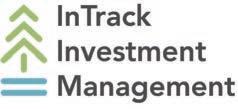
Pianist Paul Orgel will play a concert at Ohavi Zedek, 188 North Prospect Street in Burlington, on March 23 at 4 p.m.
Orgel has played concerts throughout the United States, Europe, and China as a recitalist, soloist with orchestra and chamber musician. Critics have praised his playing for its “subtlety and attention to nuance” (Philadelphia Inquirer), “rare pathos” (New York Times), “brilliant technique, sense of humor and fantasy” (Bridgeport Post), “warmth and beauty of sound” (Barre-Montpelier Times Argus), and “power and grace” (Vermont Times).
The concert will benefit Full Circle Preschool in Burlington.
Farmers of all scales and types — farm workers, agricultural students, educators, and professionals, farm service providers, and anyone who supports Vermont’s food system and working landscape — are invited to join the Vermont Farm Show Board for an in-person conversation about the future of the Vermont Farm Show.
This gathering is the last of five to occur across the state this winter and is taking place at the UVM Extension office in Berlin on Tuesday March 11 from 1:303:30 p.m.
Attendees will connect with others, engage in facilitated conversation, and can offer their input on what kind of Farm Show can best serve Vermont’s changing agricultural needs. Snacks will be provided.
For more information visit, www. vtfarmshow.com.
Do you have skills in fundraising, grant-writing, marketing, bookkeeping, event planning, or website design? Consider volunteering with the South Burlington Library Foundation.
The foundation was created to support the ASPIRE Campaign, which raised $1 million to support technology, collections, and more to open the library building.
The Foundation’s fundraising efforts support events, programming, collections, technology, professional development, and welcoming spaces for library-goers of all ages and backgrounds. Find out more at southburlingtonlibraryfoundation.org.
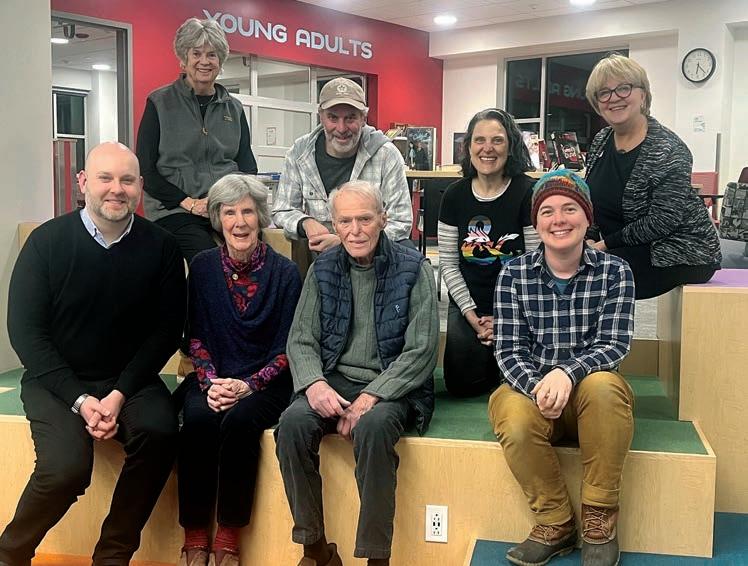
Ski photographer holds ski museum talk

The Red Bench Speaker Series presents “Celebrating 60 Years of Stratton Photography with Hubert Schriebl,” Thursday, March 13 at 6:30 p.m. at the Vermont Ski and Snowboard Museum.
Born in Austria, Hubert Schriebl was a ski and mountain guide working for the Austrian Alpine Club before he was hired by fellow Austrian Emo Henrich to teach at the Stratton Ski School. Arriving in Vermont on Christmas Eve of 1964, Hubert immediately embraced the Green Mountain State as his home. It wasn’t long before his talent for photography was recognized, and in 1968, he became Stratton’s official photographer.
Hubert’s work at Stratton spans six decades. Through his lens, he has documented not only the ski industry’s growth but also iconic winter sports moments and everyday mountain life. His work has been featured in numerous publications including, SKI, Skiing, GEO, Time, Newsweek, Sports Illustrated, Vermont Life, and Stratton Magazine.
In 2009, the Vermont Ski and Snowboard Museum recognized Hubert’s outstanding contributions to the ski industry with the Paul Robbins Journalism Award.
Event admission is $10 and helps support the Museum’s mission to “collect, preserve, and celebrate Vermont’s rich skiing and snowboarding history.”
Several South Burlington students received academic honors for the fall semester. Their colleges sent the news along to the newspaper.
The following Community College of Vermont students were named to the fall 2024 President’s List, which recognizes full-time students with a 4.0 grade point average: Amisha Gurung, Hannah Holliman, Reid Miller, Libby Galper.
The following CCV student were named to the fall 2024 Student Honors List: Melanie Dube, Bryan Ford, Anita Isufi, Huane Li, Abdirisak Maalin, Dylan Mapes, Stacey Savage, Wyeth Talmon, Nicole Welch, Madison Hogaboom.
The following CCV students were named to the fall 2024 Dean’s List: Jamyang Anak, Jules Butler, Brayan Dellechiaie, Katelyn Fontaine. August Frazier, Latazsha Gibbs, Maya Jones, Olivia Kelly Hinterberger. Austin Reichard, Jack Savas made
the dean’s list at Fairfield University. Sam Mazza-Bergeron was named to first honors on the Clark University dean’s List.
The following students have been named to the Champlain College Trustees’ List for achieving a 4.0 grade point average for two or more consecutive semesters: Nilufer Gungor, Mohammed Hussein, Taylor Tomasi.
The following students have been named to the Champlain College President’s List: Fathima Babu, Jasmina Besirevic, Jaren Brigham, Yin Bo Chen, Abby Mcneil, Lillian Nguyen-Kenney.
The following students have been named to the Champlain College Dean’s List: Salma Badra, majoring in Filmmaking; Harish Bhattarai, majoring in finance; Marjorie Candreva, majoring in professional writing; Jaden Cypes, major-
continued from page 6
Shelburne has houses for sale between $850,000-$900,000. In Williston, a new home will cost between $500,000-$800,000.
Who can afford these sky-high prices? Out-of-state buyers and investors, that’s who, not Vermonters with modest incomes or those who wish to move and live here year-round, participate in our job market and invest their time and energy in our communities. For thousands of Vermonters already here and potential new residents, that’s a crisis fermented by greed and profits over people.
Today in Vermont, only 72.8 percent of our existing home stock of 342,375 homes are occupied year-round. In 2020, sales to out-of-state buyers jumped to 38 percent, as reported in VTDigger, and that trend has yet to slow down. In 2021, a quarter of all homes went to out-of-state buyers, and in 2023, 17 percent of our housing stock was bought by out of state investors, resulting in a total of 58,038 vacant or partially vacant homes, as cited by the US Census.
project in Hinesburg, and South Carolina developers are pitching a 73-unit housing project near the golf course in Stowe.
While Donald Trump eyes Canada, the Great Gulf Corporation of Toronto wants to build a 2,500-unit village in Killington. Down in Hartland, a Florida developer with a focus on luxury lifestyles has been battling local officials opposed to his farm store/deli/bakery plan.
As usual, deeppocketed buyers and investors from outof-state want their piece of Vermont.
Undoubtedly there are many more out-ofstate investment companies with an appetite for Vermont.
Do they have Vermont’s best interests and needs in mind?
As usual, deep-pocketed buyers and investors from out-ofstate want their piece of Vermont. For example, Brookfield Asset Management, part of a Toronto–based global investment firm, owns the Equinox Resort.
How can we stop this investment grab, which is contributing to our affordable housing shortage? Can we require out-of-state development companies to build more affordable homes? How can we encourage our local builders of new homes and apartments to respond to the housing needs of regular Vermonters and our local business community and not to the out-ofstate market of wealthy investors who are willing and able to pay top dollar? These questions must be answered if we hope to address our housing shortage.
A partner in a major Boston luxury construction company is proposing a restaurant in Woodstock. Abraham Properties from Atlanta is developing a housing
Perhaps the 3.62-percent transfer tax needs to be dramatically increased. In 2020, that small percentage raised $1.43 billion dollars. How about making those who live in their second homes fewer than 182 days a year pay the full amount of Vermont property taxes like
the rest of us, or have them pay higher real estate taxes? Should they be able to claim a non-homestead second home as a primary homestead, and qualify for tax relief?
In too many Vermont towns, primary homeowners are paying higher property taxes than that paid on a vacant or rental home next door, often owned by an out-of-state, non-homestead investor.
Should we make renting a vacant second home as an Airbnb more difficult, with more taxes placed on the rental income received? How about eliminating the mortgage interest deduction on a second home here? Other states like California have done that.
Would we lose some investors and buyers and the revenue they bring to the state if we implemented these and other similar policies? Sure, but wouldn’t it be better to have a full-time Vermonter living in that home year-round, employed and spending their money in our local economy, and contributing their spare time to our civic life?
Decreasing the number of those 58,038 vacant, second homes in our small state, combined with more control of out-of-state investors, while encouraging local developers to build truly affordable homes, will help address our housing shortage. Absent that, Vermont’s housing shortage will remain a well-fermented crisis created by greed and padded profit margins.
John Bossange is a resident of South Burlington and a board member or Better not Bigger Vermont. BOSSANGE














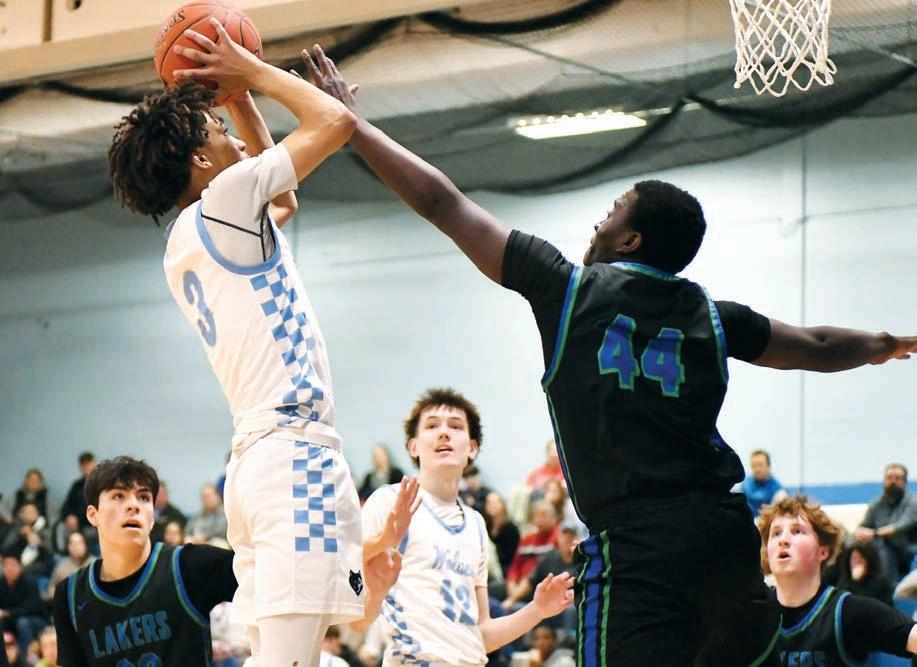
LAUREN READ
CORRESPONDENT
Boys’ basketball
South Burlington’s postseason run came to an end on Monday night in the Division I boys’ basketball semifinals, played at the University of Vermont’s Patrick Gym.
The Wolves fell to top-seed Burlington, 73-53, to wrap up the season with a15-7 record.
South Burlington had an early lead in the first quarter but Burlington came back to take the lead in the second frame and pulled away with a 24-10 run in the third quarter.
The Wolves tried to pull it back in the fourth quarter but could not contain the Seahorses’ offense, which scored 27 points from behind the three-point line.
Will Goyette paced the Wolves with 16 points and six rebounds, while Kai Davidson added 10
points and Oli Avdibegovic chipped in with eight points.
Burlington was led by 14 points and 10 rebounds from Abdi Sharif. Khamis Ali added 16 points and Pascal Munezero chipped in 15 points.
The game was the first semifinal appearance for the Wolves since 2021. The Wolves handed top-seeded Burlington its only loss
See SEMIFINAL on page 11
LAUREN READ CORRESPONDENT
Girls’ basketball
Division I playdowns
No. 11 South Burlington (4-16) at No. 6 Rutland (12-8), Tuesday at 7 p.m.
South Burlington looked to pull off an upset as the Division I girls basketball playoffs got underway on Tuesday.
The Wolves earned the No. 11 seed with a 4-16 record and traveled to face Rutland on Tuesday night, in a game played after press deadline.
Rutland beat South Burlington once during the regular season, a
46-28 win yearly on in the schedule.
The Wolves will have to pull off the upset to face No. 3 Burlington in the D-I quarterfinals.
Boys’ hockey
Division I quarterfinals
No. 6 Rutland (10-10-1) at No. 3 South Burlington (14-6), Wednesday at 5:15 p.m.
South Burlington looked to advance back to the Division I state championship game this season, but there are a couple of opponents to beat to book the spot.
First up was Rutland, which traveled to South Burlington on Wednesday at 5:15 p.m. for the
D-I quarterfinal matchup, in a game played after press deadline.
The Raiders handed the Wolves one of their six losses this season, beating them 3-2 in the only regular season matchup between the two teams.
South Burlington will have to beat Rutland to advance to the semifinals where they will face the winner of No. 2 Spaulding vs. No. 7 BFA-St. Albans.
The Wolves beat BFA twice in the regular season and Spaulding once so would have some familiarity with either opponent. No. 1 Rice is undefeated and looking to repeat as the D-I state champs after beating South Burlington in the final last year.
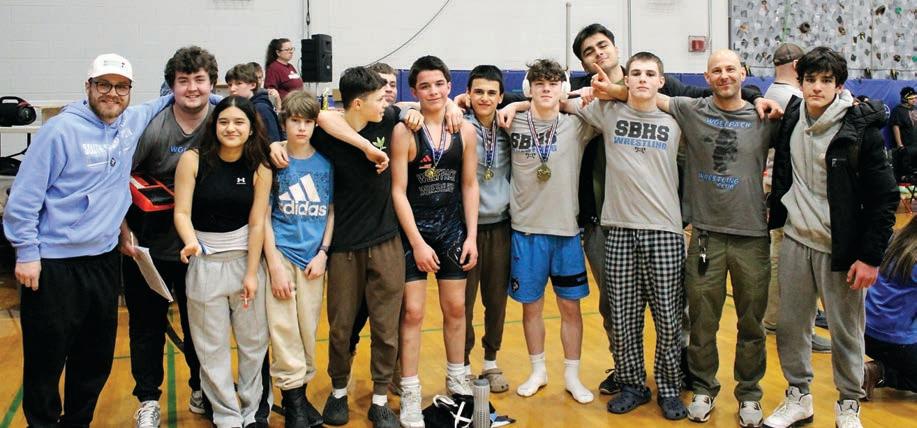
The Vermont state wrestling tournament was held in Barre on Feb. 28-March 1, and South Burlington High School sophomore Sam Zuchman made history by placing third and becoming the first SBHS wrestler to qualify for the New England championships.
continued from page 8
ing in computer science and innovation; Amin Daoudi, majoring in computer networking and cybersecurity; Tenzin Dhondup, majoring in graphic design and visual communication; Rachel Guyette, majoring in criminal justice; Carter Marshall,
continued from page 10 of the regular season — a 70-68 win over the Seahorses in late January. Burlington got the early regular season win, beating South Burlington 80-56.
As the winner of Monday’s rubber match, Burlington advanced to the Division I state championship on Friday at Patrick Gym.
No. 4 South Burlington 52, No. 5 Rutland 42
The Wolves advanced to the semifinals with a win over Rutland on Friday in high school boys’ basketball.
Kai Davidson led the way for the Wolves, hitting three three-pointers and finishing with 14 points. Oli Avdibegovic added a double-double, scoring 13 points and grabbing 14 rebounds, for South Burlington. It was a double-double for Will Goyette, who chipped in 10 points and 10 rebounds, while Deng Aguek had eight points and Markus Flanders scored seven points.
South Burlington’s team, in only its second year, outscored a number of more established programs.
The squad is led by coaches Jack Carney, former three-time state champion, and Alex Zuchman.



In the middle school/JV state meet the prior week, freshman Henry Dodge won a championship, as did AP Zuchman and Sam Hoffer. The team’s first female wrestler, Charu Magar, qualified for the Girls’ New England tournament.
majoring in game design; Joshua Mathieson, majoring in game programming; Alanna Nguyen-Kenney, majoring in game art; Jordyn O’Brien, majoring in business administration; Tenzin Palden, majoring in graphic design and visual communication; Benjamin Parker, majoring in writing and publishing; Sophia Stark, majoring in business administration.
Bridget O’Keefe, a biochemistry major at Connecticut College made the dean’s list for
high honors, for the fifth time in five semesters.
Tufts University dean’s list honors go to Nadia La, Class of 2025, and Clara Margulius, Class of 2027.
Adele Bounds and Casey Hockenbury were named to the Siena College 2024 Dean’s List.
Carter Higgins, a sophomore, and Lilly Truchon, a junior majoring in neuroscience, were named to the Dean’s List at Hamilton College for the fall 2024 semester.
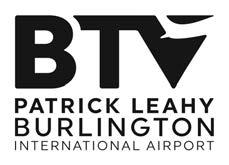
The City of Burlington is announcing that the FAA has determined that the year 2024 and 2029 Noise Exposure Maps (NEMs) prepared for Patrick Leahy Burlington International Airport (BTV) were developed in accordance with the procedures outlined in Appendix A of Title 14, Part 150 of the Code of Federal Regulations.
The NEMs may be downloaded using the links on the website below. For further information, please contact Larry Lackey, Director of Planning, Engineering and Sustainability at 802-338-8106. Visit www.btvsound.com for the 2024 and 2029 Noise Exposure Map.


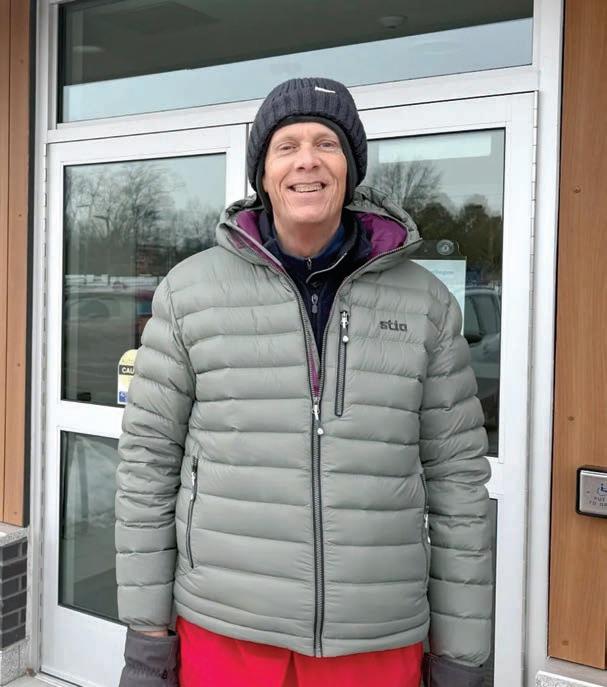
A sense of duty. Purpose. An important lesson to pass on to younger generations.
These are some of the reasons voters gave for participating in Town Meeting Day in South Burlington. In addition to voting on school and town budgets and two city council races, they wanted to show their support for democracy at a crucial time.
“I feel like it’s a right that’s under attack,” Havaleh Gagne said. “I always vote, and that’s what I taught my daughter to do. School board, budget, it doesn’t matter. Every election matters. Every time.”
Cheerful South Burlington city councilman Tim Barritt stood outside of City Hall, donning bright red “pseudo-Gore Tex” snow pants. Barritt ran unopposed in this year’s election.
“It’s my civic duty,” he said of voting. “Don’t complain about farmers with your mouth full of food. Don’t complain about politics if you don’t vote.”
The only contested race on the ballot pitted incumbent council member Elizabeth Fitzgerald against challenger Lydia Diamond. Greg Merhar of South Burlington wished voters had more options.
“There wasn’t much choice,” Merhar said. “This wasn’t a big city council year. It’s not like other
continued from page 1
• Penny for Paths and Open Space Fund: $872,500
• Rental registry: $373,000.
Property taxes are expected to increase roughly 3.33 percent to pay for the budget, significantly lower than the 7 percent tax hike originally projected in September. That means the average homeowner can anticipate a roughly $83.59 increase in property taxes over last year, while the average condo owner could see an increase up to $56.50, according to city officials.
Utility rates across the city’s sewer, water and stormwater systems are set to increase by an average of $67 more for the average city homeowner, city manager Jessie Baker said. This is the only area of the budget where the city is seeing an addition of staff — one new employee to maintain the roughly 45 pump stations across the city and another to support the Bartlett Bay wastewater treatment plant.
The spending plan maintains the current level of staffing and support for police, fire and emergency medical services while increasing investment in the city’s community outreach team and Community Justice Center.
The community outreach team is made up of Howard Center
towns where they get together and have chili in a fire station.”
Merhar, who’s lived in South Burlington for 12 years, expressed frustration at continual property tax increases.
Rep. Bridget Burkhardt, D-South Burlington, stood in front of City Hall, braving the wind to show her support for Elizabeth Fitzgerald and write-in school director candidate Emilee Hoffman. Burkhardt says state lawmakers have a greater role in the school budget than many realize.
“I think a lot of the challenges driving up the school budget are out of the school district’s control,” she said. “They’re much more in the control of Montpelier and we need to get our act together to try to do some education funding reform.”
Debra Leonard said she views voting as a powerful tool. Leonard is chair of Pathology and Laboratory Medicine at UVM Medical Center. Leonard also hopes to see South Burlington potentially elect Diamond, its first woman of color.
“There’s no more powerful way to impact what’s going on in the world than by voting. So, we have to exercise our right,” Leonard said.
Via Community News Service, a University of Vermont journalism internship, on assignment for The Other Paper.
employees embedded within the police department who respond with officers to calls related to mental health or substance misuse crises. Historical funding for those two programs has shifted this year, Baker said, forcing the city to invest more than previous years.
“The goal of this program is really to ensure that our neighbors are getting the best support they can at the lowest level,” she said.
the community and some of the comments we’ve heard tonight and what our neighbors were facing,” Baker said during an informational meeting Monday night.
“We did want to be very conscious of the affordability of the community.”
— Jessie Baker
“We know that a badge and a gun is often not the intervention needed, so want to make sure that we are connecting people to services as quickly as possible.”
Additionally, the city has increased its funding for Green Mountain Transit by roughly $54,000.
Overall, the budget maintains the city’s current level of services while maximizing property tax revenue by aggressively budgeting for things like the local option tax.
“We did want to be very conscious of the affordability of
The revenue plan also accounts for increased permit and electrical inspection fees along with an increase in ambulance billing. The council also opted to fund all climate-related capital improvement projects this year with $244,000 of American Rescue Plan Act funds.
Two familiar faces have secured their spots again on the city council.
Tim Barritt, who has served as the current council chair and ran unopposed for another three-year seat. Fellow incumbent Elizabeth Fitzgerald beat her opponent, Lydia Diamond, 2,150-802. The council held a reorganization meeting Wednesday night after The Other Paper went to press.
Take out
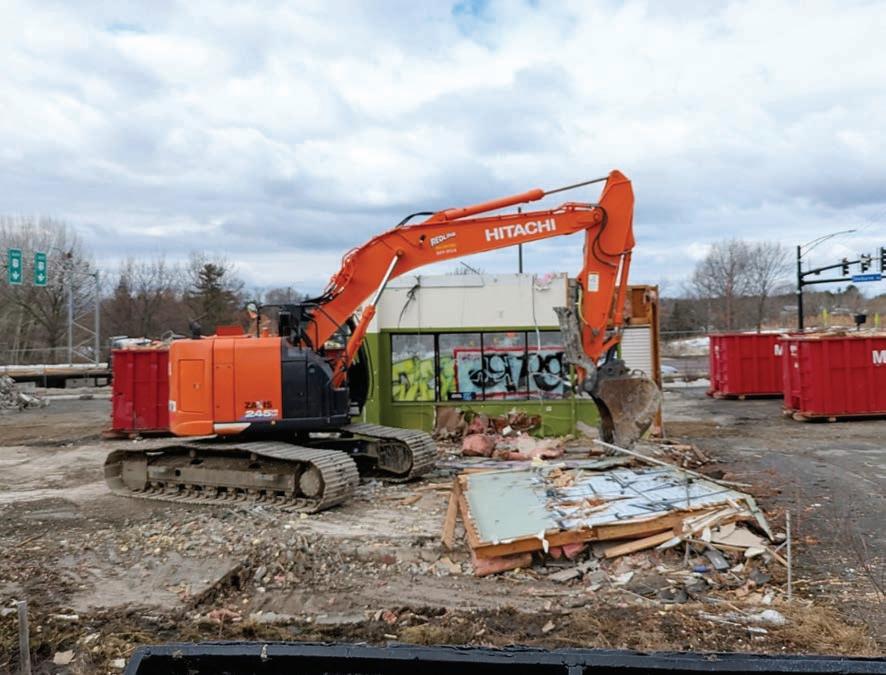
MEGAN DILLON COMMUNITY NEWS SERVICE
As voters filed in and out of the Senior Center at South Burlington’s City Hall Tuesday, the proposed school budget was on the minds of many. The issue was a divisive topic, with a few residents pausing outside the building to voice their strong opinions on the proposal.
This year, school officials had the unenviable task of coming up with a budget that would protect key programs while passing muster with voters frustrated with increased taxes.
“It’s impossible to satisfy everybody in the middle, but we hope for the best.”
The proposed budget did not satisfy Craig Monroe, who has a son in the school system.
“It’s absolutely ridiculous,”
Monroe said. “We’re getting robbed already, so I don’t think they need any other dimes.
“It’s impossible to satisfy everybody in the middle, but we hope for the best.”
— Tim Jarvis
“There’s a lot of people that are opposed to the budget because it’s too much, and a lot of people who are opposed to the budget because we are cutting too much,” said Tim Jarvis, senior director of operations and finance for the South Burlington School District.
continued from page 1
lowest tax rate increase in Chittenden County, behind Winooski, which saw a 42-percent tax rate decrease. Other neighboring towns throughout the county saw increases of up to, and even greater than, 14 percent.
The district last year was able to leverage $3.2 million from its budget surplus to keep the tax increases well below 10 percent. Without that surplus money, though, the budget would have seen a nearly 15 percent tax increase. But this year, without any extra funds, the district had to face even sharper cuts than it did last year.
In addition to cutting nearly 15 positions, the new spending plan also accounts for a nearly $140,000 reduction in athletics, the Big Picture Program — an independent learning program — and the Japanese language program, among others.
Opinions about the district’s
I voted ‘no’ because money doesn’t grow on trees.”
Sen. Thomas Chittenden, D-South Burlington, said he voted yes on the budget. He graduated from South Burlington High School himself in 1995 and has three kids currently in the school district.
“I care a lot about our kids,” Chittenden said. “I’m trusting the school board and the administration to have chosen a budget that makes sense for the voters.”
Courtney Price did not know how he was going to vote when
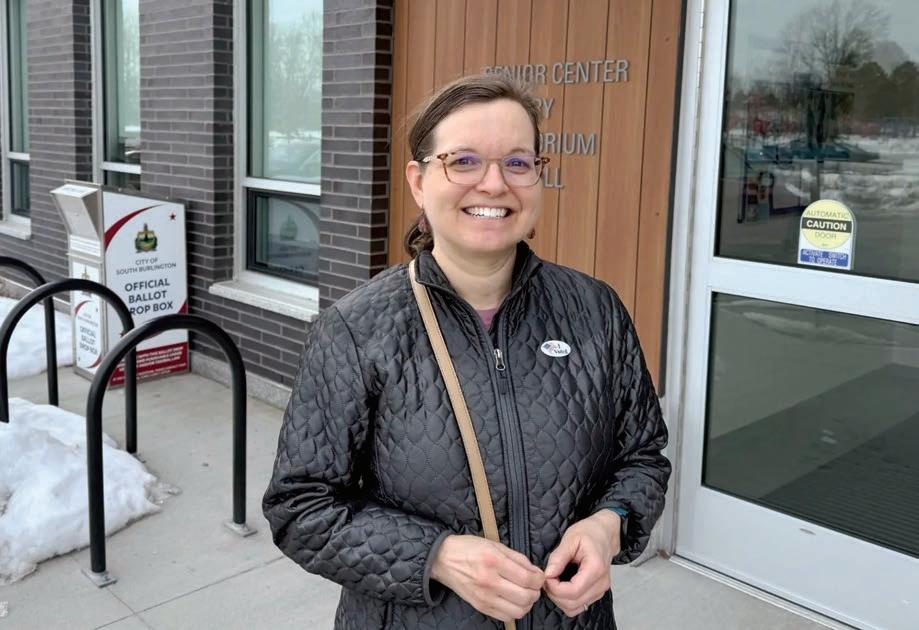
he entered the polling place. The uncertainty around federal support for education funding influenced his final decision.
“As far as funding education, I have no idea. I just threw it up in the air because of federal funding,” Price said. “Who’s going to do it? I guess we’re going to do it.”
Via Community News Service, a University of Vermont journalism internship, on assignment for The Other Paper.




spending plan have not been unanimous — and have been, at times, contentious — since the start. Two school board members in January voted against adopting it. Similarly, dozens of residents have expressed their apprehension, some citing concern over the reduction of certain programs and others concerned with the loss of several student-facing positions, with nearly no cuts coming from the administrative or central office level.
Internally, the South Burlington Educators Association sounded the alarm to officials in February that the lack of vision around how the school will function without these positions and programs could leave an undue burden on other staffers to pick up the pieces.
Still, the union had said, at the time, it was pushing strongly for “yes” votes from the community. The majority of residents heeded that call.
There were no contested races for six open school board seats this year, and they all now have a seat at the table, including one write-in candidate who launched a last-minute campaign for a seat with no bidders.
Election results
• Incumbents Tim Warren and Laura Williams were re-elected to a pair of three-year terms.
• Newcomers Seamus Abshere and Jennifer Lawrence were elected to a pair of two-year seats.
• Dan Boyer was elected to finish out one year on a two-year seat vacated by a former board member.
• Emilee Hoffman, a writein candidate who launched a late campaign, was elected to the final year of another three-year term.
The board held a reorganizational meeting March 5 after The Other Paper went to press.


















• View a complete online copy of the print edition
• Read the latest news
• Find out about sales and events
• Stay up to date on local happenings VTCNG.com/OtherPaperSBVT/digital_edition
Sign up for our Friday EMAIL NEWSLETTER
Headlines and news sent directly to your inbox every Friday at 10 a.m.
Sign in and add your weekly newsletter: VTCNG.com/users/admin/mailinglist Our DIGITAL EDITION is Available Thursday at Noon



brighthorizonstaxsolutions.com
























LIBERTY DARR STAFF WRITER
A small group of people at the Vermont Teddy Bear Factory are making dreams come true — and the whole ordeal just got a whole lot more magical.
The Make-A-Wish Vermont team aren’t magical fairy godparents, but they harness just as much of that charming energy.
The team has operated out of the factory since 2021, and celebrated its fourth anniversary on Valentine’s Day, fitting for the amount of love and dedication the team pours out week after week. The daily tasks are anything but simple: creating life-changing wishes for children with critical illnesses.
“Oftentimes, my boss is a six-year-old,” Make-A-Wish Vermont president and CEO Jamie Hathaway said. “We want every contact a child has with the program to be just as magical as the wish itself.”
And that is true, both the building itself and the team who make the entire operation seem somehow effortless.
From the moment a child enters the building, they are showered with care. From games to personalized projections on the winding staircase that leads them to the wishing space, a place where wishes exceed the walls where kids across Vermont dream them up.
“It’s really important for us to just make sure that every wall is filled with bright colors and a space for inspiration, happiness, play,” Emily Malley with MakeA-Wish Vermont said. “We just didn’t want this to feel like a place where people work, and that’s why our offices are really secondary to everything else.”
The walls of the room — which is filled with bean bags, toys and stuffed animals — also tell their own story, with former wish-kids pictured in framed glass along the way.
The wishes all vary depending on the child, from a new pool to a trip to the Los Angeles Fire Department or Disney World, to creating their own Nike shoe or meeting President Barack Obama, no wish is out of reach for the team that somehow finds a way to bring every aspect of the plan together. Sometimes, the wishes take on a life of their own.
“They explode,” Jamie Heath with Make-A-Wish Vermont said.
“I think all of these are great examples of how the wish really does go beyond the wish child. Of course, our wish child is our number one priority, but the joy is spread far beyond that,” Malley said. “The families are so greatly impacted, of course, and then the communities that end up getting involved will never be the same
after doing that. It’s really far reaching.”
What’s even more telling is how the staff can still remember almost every child that has passed through those Make-A-Wish doors, each with their own special connections to different kids. The work is difficult, especially dealing with chronic illness, which has forced the team to create a unique bond that helps each of them move through hard times, even death, together.
“It’s hard when you think about that part of it. It’s a roller coaster sometimes,” Malley said, tears welling. “We’ve all been through a lot together and we’re fortunate, in that way, to lean on each other through those tough times.”
At the opening, the team unveiled an innovative 180-degree immersive Wish Discovery Theater, which creates an inspiring environment where children can begin to imagine their wishes. The new theater is a replica of the one located at the Saratoga Springs headquarters, and was envisioned from the start by Hathaway, whose passion for the work is often displayed in gestures that far exceed the imaginable.
The idea is for a child to be in the theater and really start imagining what could be possible for their wish, and part of that is through watching the animated version of Jamie Heath’s book that she wrote in 2018 after she was a wish kid.
The illustrated picture book, “Wishes are Medicine! How MakeA-Wish Gave Me Hope & Helped Me Heal,” recounts Heath’s own journey through chronic illness and how the Make-a-wish team — with the help of her pet turtle, Bob — gave her the opportunity to visit Hawaii and swim with sea turtles.
Now, Heath helps make dreams happen for other wish kids every day.
“Oh my goodness, it has become more than I can ever imagine,” she said of the book.
The theater was made possible through a $125,000 donation from Vermont Construction Company and help from the team at BETA Technologies in South Burlington. Make-A-Wish’s own Quinten Lewis, Manager of Wishes and Special Projects, put most of the finishing touches on in house, which took roughly half a year to complete.
For Hathaway, the new theater is just another extension of what Make-A-Wish is all about: confronting fear with love.
“What I told somebody yesterday is, every time I come into work, I’m reminded of a better side of human nature and the real magic of Make-A-Wish is knowing you’re not alone,” he said. “When we’re able to take the canvas and fill it full of hope, joy, love, support, then we’re really doing our job.”

Wish Kids past, present and future gathered last month for
space for them to begin to imagine where their wish might take them.
